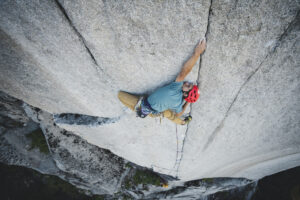In the northern Indian province of Himachal Pradesh, Rakchham is a small village with a big secret. It is home to a cache of boulders which are ideal for sport climbers. The rock forms are hidden from most of the world, but one Austrian climber has developed a way to mutually benefit the climbing community, locals, and nature.
Bernd Zangerl is a bouldering legend. He has accumulated more than 20 years as an alpinist and climber. For the past 11 years, he has returned to Rakchham for bouldering.
Sacred peaks, some of them destinations for pilgrims, surround Rakchham. Villagers live simply in this quiet spot. The fertile soil grows buckwheat, kidney beans, and potatoes.
Since Zangerl visits so regularly, he has come to know the locals well. They understand that he also has a spiritual connection here. Zangerl describes it as a peaceful place where you can just “be”, without traffic, commerce, or distractions vying for your attention.
No Shangri-La
But Rakchham isn’t immune to the world’s problems. Litter despoils nature here just as over-tourism has threatened the nearby Himalaya.
Even though the environment is a global concern, small villages like Rakchham witness its issues magnified. It’s reasonable for the villagers to be cautious about foreigners coming to use their fragile land for climbing.
Zangerl doesn’t want to see Rakchham self-sabotaged, as other parts of the Himalaya have been.
As a way to create sustainability between climbing and nature, Zangerl founded a club. His Rakchham Climbing Adventure Club tries to benefit all. The climbers train local kids so that one day they may earn a living as climbing guides. Climbers support families by paying for homestays in a region that needs some outside income.
Most importantly, club members collect litter. “Climbers cannot forget that we are guests,” Zangerl says. “Tourism can only be sustainable when we have the support of the local population and respect their local customs.”






